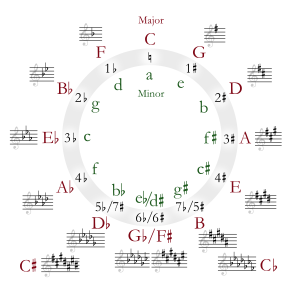| This article needs additional citations for verification. Please help improve this article by adding citations to reliable sources. Unsourced material may be challenged and removed. Find sources: "F major" – news · newspapers · books · scholar · JSTOR (February 2024) (Learn how and when to remove this message) |
| Relative key | D minor |
|---|---|
| Parallel key | F minor |
| Dominant key | C major |
| Subdominant | B-flat major |
| Component pitches | |
| F, G, A, B♭, C, D, E | |
F major is a major scale based on F, with the pitches F, G, A, B♭, C, D, and E. Its key signature has one flat. Its relative minor is D minor and its parallel minor is F minor.
The F major scale is:
F major is the home key of the English horn, the basset horn, the horn in F, the trumpet in F and the bass Wagner tuba. Thus, music in F major for these transposing instruments is written in C major. These instruments sound a perfect fifth lower than written, with the exception of the trumpet in F which sounds a fourth higher.
Scale degree chords
The scale degree chords of F major are:
- Tonic – F major
- Supertonic – G minor
- Mediant – A minor
- Subdominant – B-flat major
- Dominant – C major
- Submediant – D minor
- Leading-tone – E diminished
Notable compositions in F major
See also: List of symphonies in F major- Antonio Vivaldi
- Trio sonata Op. 1/5 for two violins and basso continuo, RV 69
- Violin sonata Op. 2/4, RV 20
- Violin sonata Op. 5/1, RV 18
- Violin concerto Op. 3/7 from L'estro armonico, for four violins and orchestra, RV 567
- Violin concerto Op. 4/9 from La Stravaganza, RV 284
- Violin concerto Op. 7/10, Il Ritiro, RV 294
- Violin concerto Op. 8/3, Autumn from The four seasons, RV 293
- Flute concerto Op. 10/1, RV 433, La tempesta di mare
- Flute concerto Op. 10/5, RV 434
- Johann Sebastian Bach
- English Suite No. 4, BWV 809
- Italian Concerto in F major, BWV 971
- Brandenburg Concertos Nos. 1 & 2, BWV 1046–1047
- Wolfgang Amadeus Mozart
- Concerto for 3 Pianos, K. 242
- Piano Concerto No. 11, K. 413
- Piano Concerto No. 19, K. 459
- Piano Sonata No. 12, K. 332/300k
- String Quartet No. 23, K. 590
- Violin Sonata No. 24, K. 376
- Violin Sonata No. 36, K. 547
- Oboe Quartet, K. 370/368b
- Ludwig van Beethoven
- Symphony No. 6, Op. 68 ("Pastoral")
- Symphony No. 8, Op. 93
- Romance No. 2 for violin and orchestra, Op. 50
- String Quartet No. 1, Op. 18/1
- String Quartet No. 7, Op. 59/1
- String Quartet No. 16, Op. 135
- Violin Sonata No. 5, Op. 24 (Frühling)
- Piano Sonata No. 6, Op. 10/2
- Piano Sonata No. 22, Op. 54
- Horn Sonata, Op. 17
- Carl Maria von Weber
- Franz Schubert
- Octet, D. 803
- Mass No. 1, D. 105
- Deutsche Messe (German Mass), D 872
- Adagio and Rondo Concertante for piano quartet, D. 487
- Felix Mendelssohn
- Franz Liszt
- Transcendental Étude No. 3 "Paysage"
- Frédéric Chopin
- Charles-Valentin Alkan
- Johannes Brahms
- Ein Deutsches Requiem, Op. 45
- String Quintet No. 1, Op. 88
- Symphony No. 3, Op. 90
- Cello Sonata No. 2, Op. 99
- Anton Bruckner
- Maurice Ravel
- George Gershwin
- Dmitri Shostakovich
- String Quartet No. 3, Op. 73
- Piano Concerto No. 2, Op. 102
- Antonín Dvořák
- Symphony No. 5, Op. 76
- String Quartet No. 12 (American Quartet), Op. 96
See also
References
- Music Theory. (1950). United States: Standards and Curriculum Division, Training, Bureau of Naval Personnel. 28.
External links
 Media related to F major at Wikimedia Commons
Media related to F major at Wikimedia Commons
| Diatonic scales and keys | |||||||||||||||||||||||||||||||||||||||||||||||||||||||||||
|---|---|---|---|---|---|---|---|---|---|---|---|---|---|---|---|---|---|---|---|---|---|---|---|---|---|---|---|---|---|---|---|---|---|---|---|---|---|---|---|---|---|---|---|---|---|---|---|---|---|---|---|---|---|---|---|---|---|---|---|
| |||||||||||||||||||||||||||||||||||||||||||||||||||||||||||


